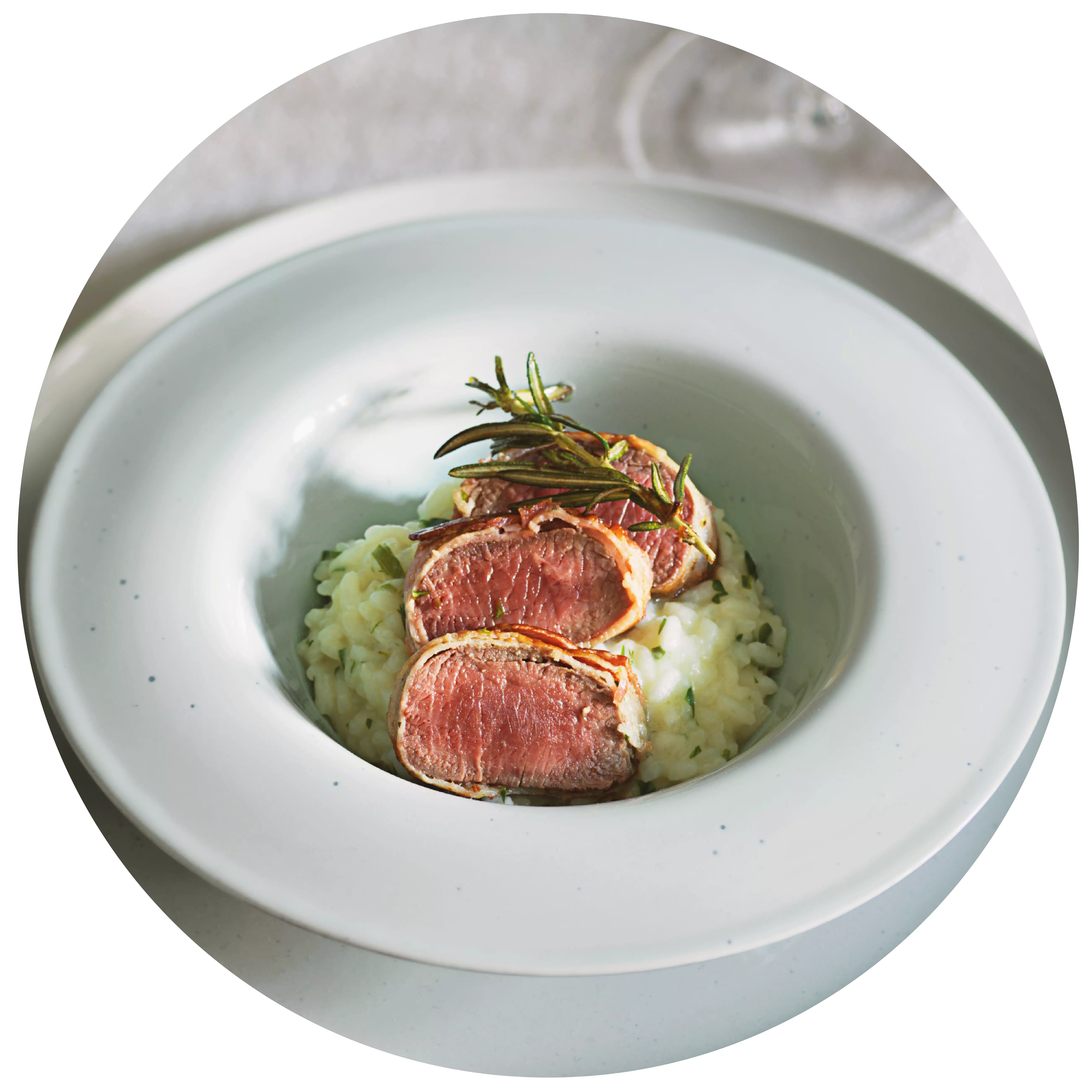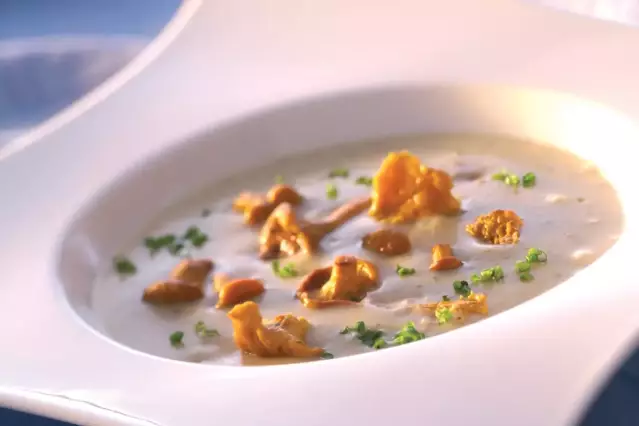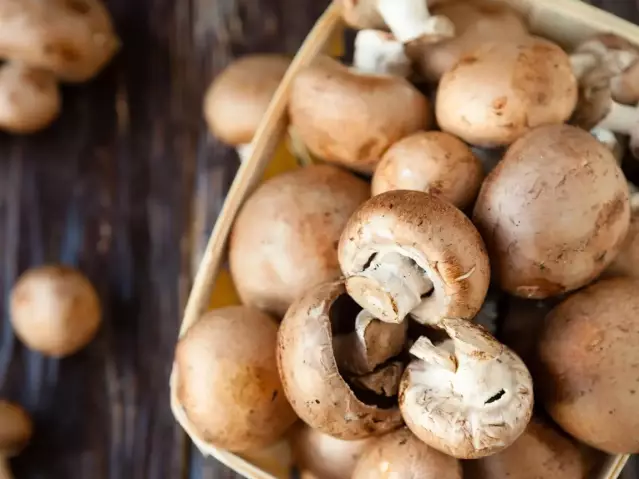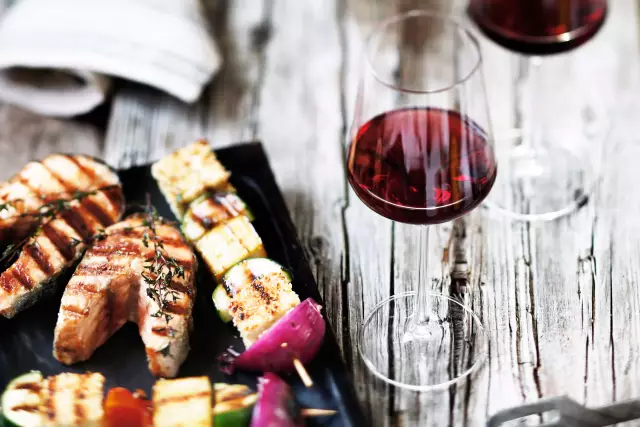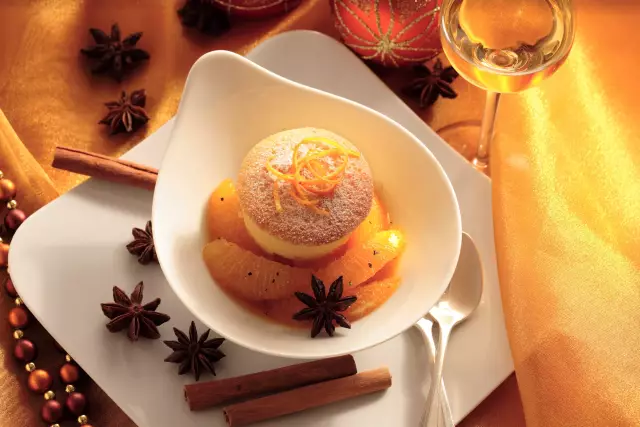Mushrooms & Wine
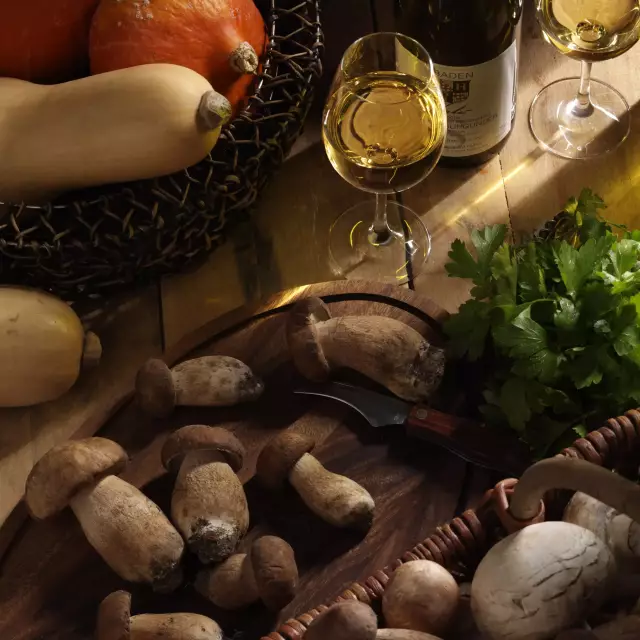
Wild mushrooms can be quite demanding in their choice of culinary partners and prefer wines with subtle and mild flavours. While a delicate potpourri of mixed mushrooms requires a full-bodied wine, flavours should not be too overwhelming.
Facts
-
2019
The chanterelle was the mushroom of the year
-
The fourth
Saturday in September is celebrated annually as European Mushroom Day.
-
About 2kg
mushrooms are consumed per capita in Germany every year
Delicious pairings - Wild mushrooms and wine
Take porcini, for instance: These most exquisite of all edible mushrooms form a perfect symbiotic relationship with a Pinot Blanc that is full-bodied yet delicately fruity. Even rather mature wines are great companions, since the subtle flavours of the mushrooms make them appear youthful and fresh. A mild acidity retains the harmony of this delicate, melt-in-the-mouth dish.
More expressive dishes, such as porcini or other mushrooms that have been fried to crispy perfection in butter, harmonize well with heartier wines with a fresh, fruity acidity, such as Riesling – a delectable alliance.
Wild mushrooms play a pleasant supporting role alongside a roast. In this case, the roast takes precedence in selecting the wine companion. However, wines such as a smooth Pinot Noir from the Ahr region or a subtle Meunier (Schwarzriesling) from Württemberg take care that the delicate mushroom flavours don’t get lost in this expressive mélange.
Mushrooms as a main dish, with a rich creamy sauce and dumplings, require a subtly fruity fresh Riesling that counters the exquisite opulence of the dish with its vivacity.
Autumn creations - wine harmony guaranteed
Whether you require a companion for delicately flavoured wild mushrooms or pumpkins: In the cellars of the German winemakers, a parade of fantastic wines is ready to give a brilliant performance on your table. And Wines of Germany has a few simple guidelines for you to follow – to avoid even the slightest hints of disharmony creeping into these alliances.
Wild mushrooms such as porcini, bay boletes and chanterelles
Braised, wild mushrooms tend to display extremely delicate flavours and acquire a melt-in-the-mouth touch. Most often, they are lightly sautéed in a frying pan with onions, only seasoned slightly and rounded off with a dash of lemon, in order to preserve their subtle nutty taste. Suitable wine companions should also help to retain the delicate mushroom flavours. A gentle Pinot Blanc or a Silvaner from Rheinhessen does a great job.
Crisp-fried in butter, porcini develop very distinct nuances. Their typical flavours form a delicious alliance with the delicate roast aromas. A smooth Riesling with a moderate fruity acidity is a welcome companion. It showcases the spicy nuances of the mushrooms. As far as red wines are concerned, a more distinctly fruity Pinot Noir or Portugieser fits the bill.
In a creamy sauce, mushroom dishes are not exactly light fare. A full-bodied Riesling or classic Pinot Gris makes for a happy combination. The wine’s balanced acidity, subtle richness and maybe even a hint of residual sugar are excellent counterparts for the potpourri of flavours created by braised mushrooms, cream and fresh herbs.
Mushrooms play an expressive supporting role alongside a roast. In this kind of menu, the roast takes precedence in selecting the wine companion. However, it’s a good idea to also pay attention to a harmonious relationship between wine and mushrooms. Smooth red wines with balanced tannins such as Pinot Noir from Baden or the Ahr region are commendable. Hearty red wines rich in tannins would take center stage here – and drown out the delicate mushroom aromas.
Can wines themselves develop a mushroom or champignon aroma?
Yes! This aroma manifests itself in earthy, spicy tones such as forest floor or foliage, but in extreme form it can also develop into an off-flavor. This strong mushroom note is caused, among other things, by the substance geosmin, which in turn can be caused by botrytis infestation.
Varietals

White asparagus with pancake strips Asparagus with "Kratzete"
White asparagus with pancake strips and champagne butter sauce.
- 1kg Weißer Spargel
- 200g Mehl
- 4 Eier
- 150ml Milch
- 1TL Butterschmalz zum Braten
- 2EL Butter
- 1 Zitrone
- 1 Prise Zucker
- 1-3 Schnittlauchröllchen zum Garnieren
- 1 Für die Soße:
- 150g Butter
- 50ml Sahne
- 50ml Sekt
- etwas Salz und Pfeffer
Mix the flour with the eggs, milk and a pinch of salt to make a smooth pancake batter. Leave to soak for 30 minutes.
In the meantime, peel the asparagus and cook in salted water with 2 tbsp butter and a pinch of sugar until al dente. Drain well and keep warm.
<p
<p>Pour the pancake batter in batches into hot clarified butter
.
pour into hot clarified butter. When the underside is browned, use a fork to scrape into pieces. Finish frying until the pieces are golden yellow.
For the champagne-butter sauce, bring the cream to the boil, reduce slightly and stir in the cold pieces of butter (walnut-sized). Add the sparkling wine and season to taste with salt and pepper.
<p
<p>Arrange the asparagus on pre-warmed plates. Add the kratzete, drizzle with the sauce and garnish with chives.
<p
<p>Wine recommendation:
A mild and dry Gutedel or a delicate Kabinett wine from Riesling or Pinot Blanc.
- Gutedel (trocken)
- Riesling (brut)
- Pinot Gris (brut nature)
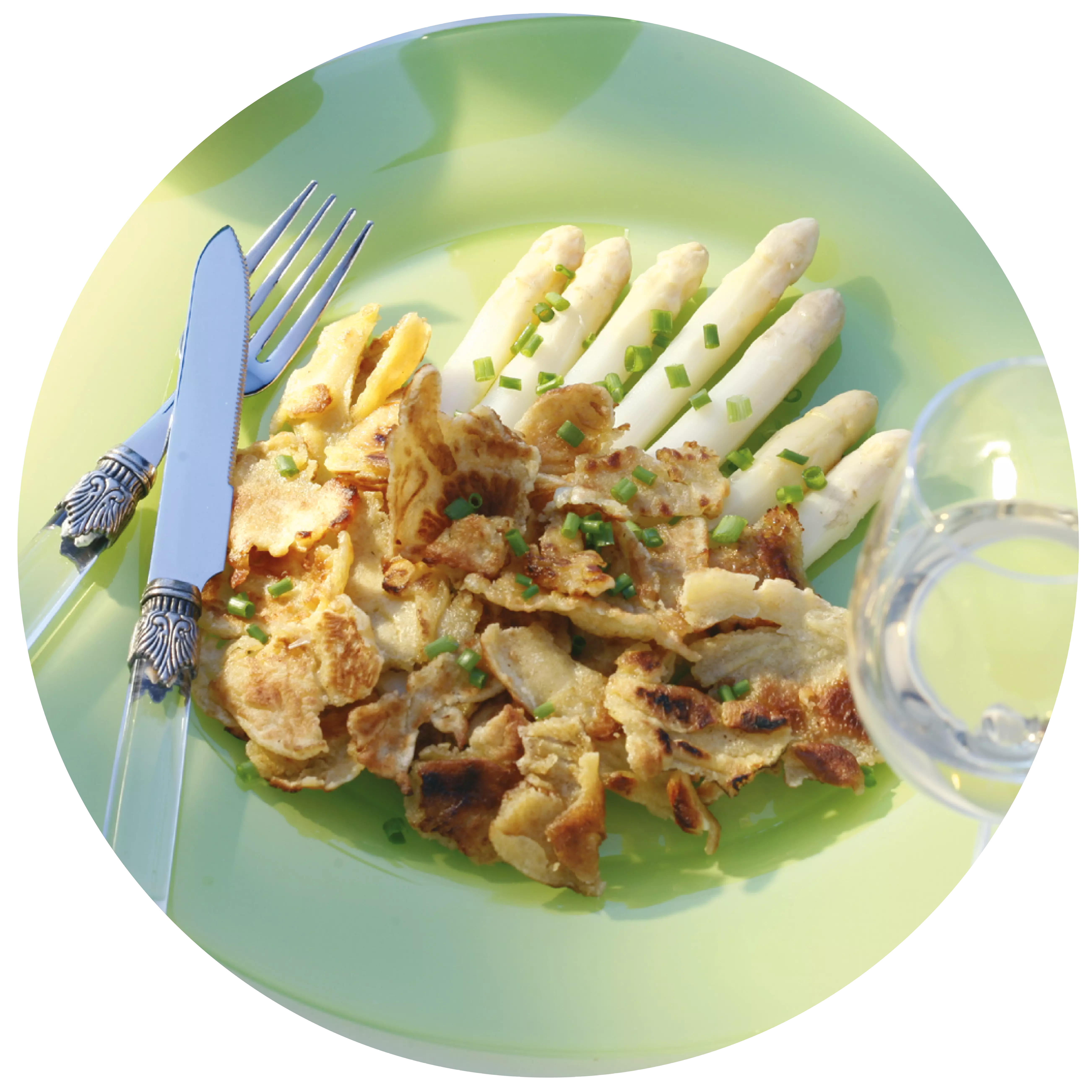
Asparagus again at last Rocket salad with green asparagus and turkey breast fillet
A light, young Rivaner goes well with green asparagus.
- 400g Grüner Spargel
- 100g Rucola
- 400g Putenbrustfilets
- 200g Kirschtomaten
- 4 Eier
- 1 EL Basilikum-Pesto
- 1TL Butter
- 2 EL Olivenöl
- 2 EL Weißwein-Essig
- etwas Salz, Pfeffer
Peel the lower third of the asparagus and cut off the ends. Cut the spears in half and cook in boiling salted water with 1 tsp butter for approx. 7 mins. Set the asparagus water aside.
Cook the eggs until almost firm (the yolk should still be a little soft), peel and cut into quarters. Cut the turkey breast fillet into strips.
Fry the pine nuts briefly without fat in a non-stick pan. Then add a little fat directly to the pan and fry the turkey breast strips. Then keep them warm.
Mix the pesto with the white wine vinegar, 5 tbsp of the asparagus water, the olive oil and salt and pepper in a salad bowl to make a dressing.
Wash the rocket and add to the dressing. Halve the cherry tomatoes and add to the bowl. Mix in the asparagus and turkey. Finally, garnish with the quartered eggs and pine nuts.</p
<p>This goes well with freshly baked ciabatta bread.
Wine recommendation:
A light Rivaner from the last harvest, fresh as spring, with delicate flavours.
- Müller-Thurgau (brut)
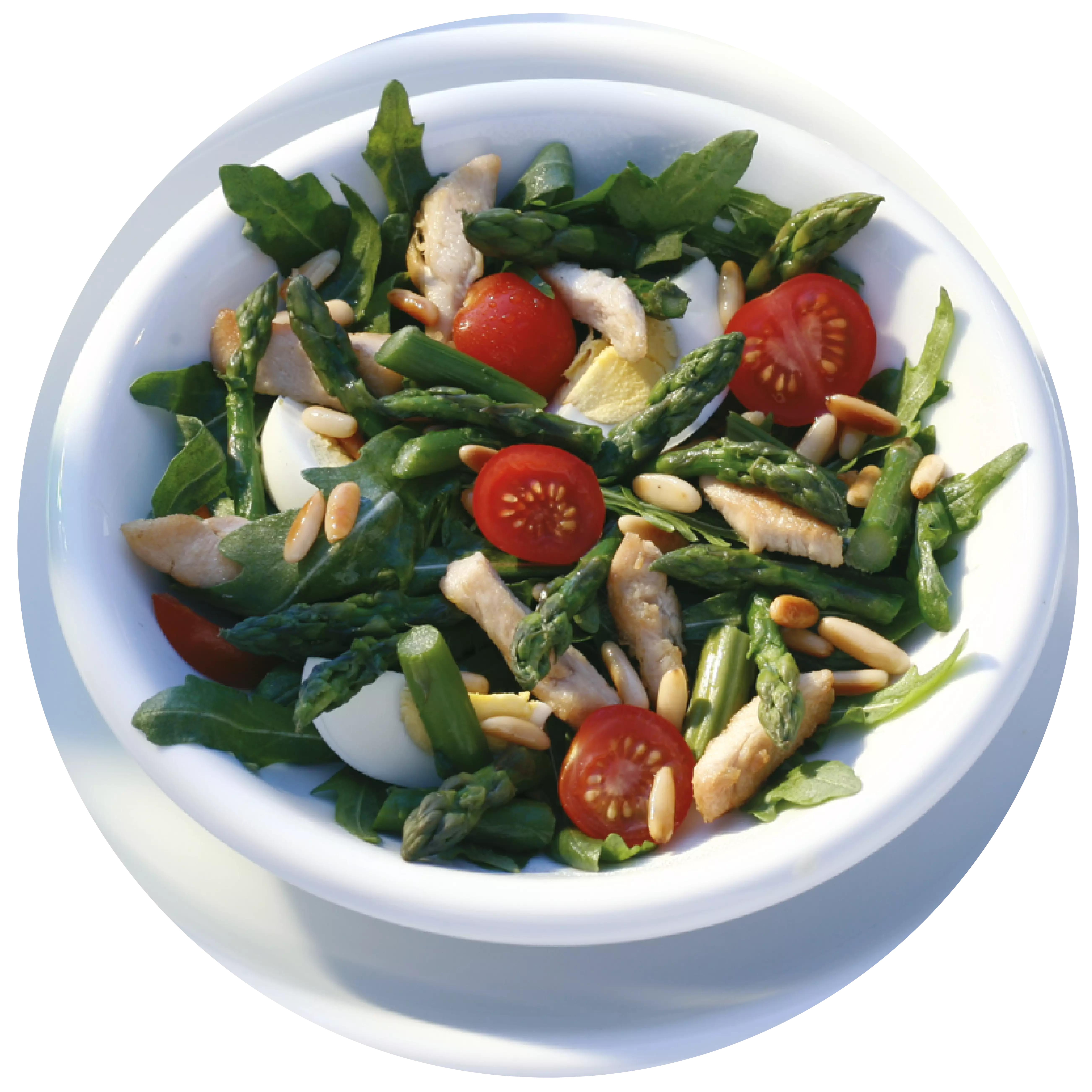
with apples Pork medallions
with apples
- 8 Stück Schweinemedaillons
- 500 Gramm Bandnudeln
- 2 große Äpfel
- 200 ml Sahne
- 10 Blättchen frischer Salbei
- 4 Zweige frischer Thymian
- nach Geschmack Zucker
- 3 EL Calvados
- 1 EL Öl
- zum Abschmecken Salz & Pfeffer
Slightly pepper and salt the medallions on both sides. Pluck the thyme, cut the sage into fine strips and roll the medallions in the herbs. Fry the meat in a pan with a little oil on both sides, not too hot, until it starts to colour. Remove from the pan and place on a preheated tray in the oven at 100 °C until cooked through.
Cook the tagliatelle al dente and keep warm.
In the meantime, peel the apples and cut into slices approx. 1.5 cm wide. Reheat the meat pan and add the apple slices. After about half a minute, sprinkle 1 teaspoon of sugar over the apples and allow them to caramelise. After a minute, deglaze the apple slices with a generous dash of Calvados and flambé. Add the cream and flavour with salt and pepper.
Remove the fillet from the oven. Add the meat juices from the oven dish to the sauce and serve the fillets with the tagliatelle, apple slices and Calvados apple sauce.
<p- Riesling (trocken)
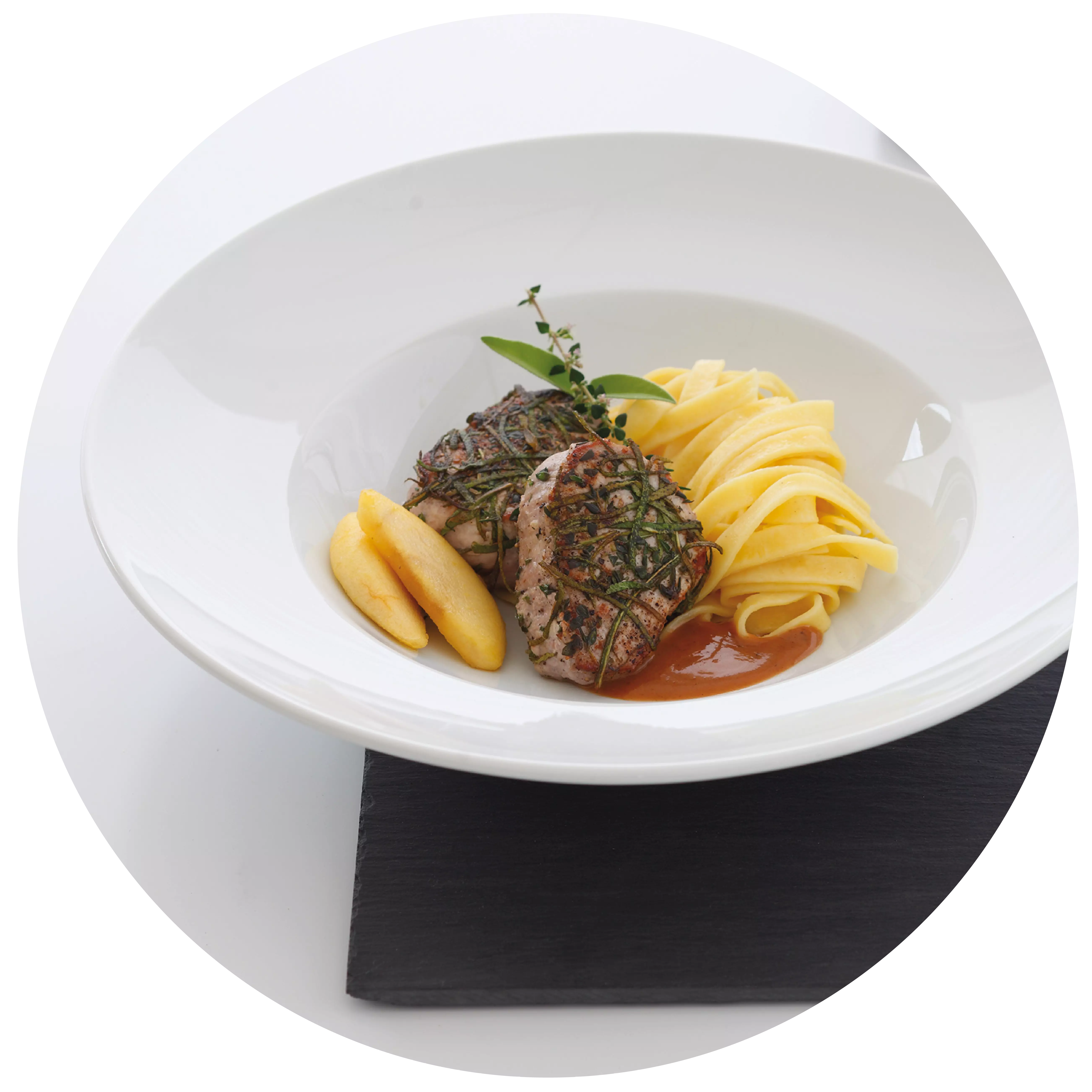
in a bacon coating Lamb
in a bacon coating
- 4 Stück Lammlachse à 150 g
- 4 Scheiben Bacon
- 0,1 Liter Wein
- 0,3 Liter Gemüsebrühe
- 1 kleine Schalotte
- 20 Gramm Butter
- 4 EL Olivenöl
- je 2 Zweige Thymian, Rosmarin, Salbei
- nach Geschmack Salz & Pfeffer
Season the lamb salmon with pepper and massage 2 tbsp of olive oil into the meat. Finely chop the thyme, rosemary and sage and season the meat in the herbs. Marinate in the fridge for a few hours.
<p
<p>Wrap the meat with the bacon slices and sear on all sides in the remaining olive oil. Continue to cook for approx. 4 minutes on each side over a low heat (the cooking time depends on the thickness of the lamb loin - it is best to do a pressure test). Then wrap in aluminium foil and leave to rest in the oven at 80 °C – so they remain juicy and slightly pink on the inside.
This goes well with Bärlauch risotto.
- Dornfelder (trocken)
